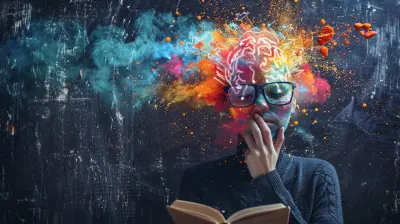Holistic Approaches to Addiction Recovery: Beyond Traditional Methods
18 May 2025
Addiction recovery is no joke—except when we’re joking about it to make the difficult journey a little easier. If you’ve ever tried quitting coffee for a single day and ended up hissing at coworkers like a feral alley cat, you know that giving up an addiction is no walk in the park.
Traditional recovery methods—rehab, therapy, support groups—are great, but what if you want something a little extra? Something that doesn’t feel like you’re trapped in a sad, gray hospital room? That’s where holistic approaches come in.
Let’s dive into some unconventional ways to kick addiction to the curb and make long-term recovery feel less like a punishment and more like a lifestyle upgrade. 
What Is a Holistic Approach, Anyway?
Before we start throwing around words like “chakra” and “mindfulness,” let’s get on the same page.A holistic approach looks at the whole person—mind, body, and spirit—rather than just focusing on the problem (addiction). Instead of just saying, "Hey, stop doing that bad thing," holistic recovery aims to heal the root causes of addiction, whether that’s stress, trauma, mental health, or just a general feeling that life is unfair and overpriced.
It’s not about replacing traditional treatment but enhancing it. Think of it as adding avocado to your toast—totally optional, but oh-so-satisfying. 
1. Mindfulness and Meditation: Taming the Chaos
Ever tried meditating? If your mind immediately responded with “Pfft. That’s for monks and hippies,” I hear you. But listen up—science backs this up.Mindfulness and meditation help retrain your brain. Addiction gets you stuck in autopilot mode, making you crave the same harmful behaviors over and over. Meditation is like hitting the mental “reset” button, forcing you to actually think before acting.
How to Start:
- Try guided meditation apps like Headspace or Insight Timer.
- Set a timer for five minutes and just breathe (yes, seriously).
- When cravings hit, pause and identify the emotion behind them.
You don’t need to sit cross-legged and hum like a monk. Just watch your thoughts without judgment. Sometimes, realizing, “Wow, I only want a drink because my boss sucks today,” is the first step to breaking the cycle. 
2. Yoga: Stretching Your Way to Sobriety
Picture this: You’re about to stress-smoke a cigarette, but instead, you drop into a downward dog.Weird? Maybe. Effective? Absolutely.
Yoga helps with addiction recovery in three major ways:
1. It reduces stress. (Goodbye, nervous energy.)
2. It increases self-awareness. (You realize, "Wow, my body actually feels better without toxins.")
3. It releases feel-good hormones that your brain has been missing.
Plus, if you’re battling withdrawal symptoms, gentle yoga movements help ease discomfort and make you feel more in control of your own body. And let’s be honest—who doesn’t love an excuse to wear comfy yoga pants all day? 
3. Acupuncture: Sticking It to Cravings (Literally)
Acupuncture sounds terrifying until you realize that tiny needles in your ears could actually make cravings disappear.This ancient Chinese practice is believed to:
- Reduce withdrawal symptoms
- Help calm anxiety and irritability
- Balance energy in the body
Many rehab centers now offer acupuncture as part of their treatment plans. Who knew that letting someone turn you into a human pincushion could be so helpful?
4. Nutrition Therapy: Because You Can’t Recover on Instant Noodles
Addiction drains your body of essential nutrients, leaving you feeling sluggish, foggy, and, frankly, like a human-shaped potato.A junk-food-heavy diet can actually trigger cravings and worsen mood swings. On the flip side, a nutrient-rich diet gives your brain the tools it needs to rebuild itself.
What to eat more of:
- Protein (to help rebuild neurotransmitters)
- Healthy fats (avocados, nuts, salmon—because your brain loves fat)
- Complex carbs (quinoa, sweet potatoes—fuel for stable energy)
- Leafy greens (your liver will thank you)
Next time you want to binge on processed snacks, ask yourself: Would a caveman eat this? If not, maybe opt for something a little more nourishing.
5. Art Therapy: Scribble (or Sculpt) Away the Urge
Sometimes, words just aren’t enough. Ever tried explaining your feelings to someone and they just… don’t get it?That’s where art therapy comes in. Painting, drawing, sculpting—these things help express emotions that are hard to verbalize. Addiction recovery is a rollercoaster of feelings, and creative outlets help process them in a healthy way.
Bonus: You don’t need to be Van Gogh. Even doodling stick figures counts.
6. Sound Therapy: Healing Through Vibration
Ever noticed how blasting your favorite song can instantly change your mood? That’s sound therapy in action.Some treatments involve listening to specific frequencies (like binaural beats) to calm the nervous system and reduce anxiety. Others involve something called sound baths, where you literally lie down and let giant singing bowls vibrate your stress away.
It sounds a little “woo-woo,” but don’t knock it ‘til you try it. Worst case? You get a nap. Best case? You feel weirdly relaxed and kinda magical.
7. Nature Therapy: Because Fresh Air Is Free
Fun fact: Spending 20 minutes in nature lowers stress hormone levels.Many holistic recovery programs encourage eco-therapy—whether that's gardening, hiking, or just sitting outside and soaking up some vitamin D. The simple act of being in nature reminds us that life exists beyond our struggles.
So, if you’re on the verge of a relapse, maybe head to a park instead of the liquor store. Just saying.
8. Animal-Assisted Therapy: Because Dogs Are Literal Angels
Let’s be honest—dogs are better than people. They don’t judge, they love unconditionally, and they’re always excited to see you.Animal-assisted therapy (think service dogs, emotional support animals, or even equine therapy with horses) helps reduce stress, ease loneliness, and build emotional connections.
Feeling overwhelmed? Hug a dog. It’s basically science.
9. Hypnotherapy: Rewiring Your Brain Like a Jedi
Hypnosis isn’t just for weird magic shows—it’s actually a legitimate tool for addiction recovery.A trained hypnotherapist can help rewire subconscious thought patterns, making addictive behaviors seem less attractive. It’s like hacking your own brain to undo the damage addiction caused.
Sounds trippy, right? But hey, if it works, it works.
Is Holistic Recovery Right for You?
If traditional methods haven’t fully worked or you’re looking for extra support, holistic approaches can be a game-changer.The trick is to combine these methods in a way that feels natural to you. Maybe you love yoga but think sound therapy is too “out there.” That’s totally fine! The goal is to build a recovery plan that’s sustainable and actually enjoyable.
Because let’s be real—if recovery feels like a punishment, it’s harder to stick with it. But if it feels like a journey toward becoming the best version of you? That’s where the magic happens.
Final Thoughts
Recovery isn’t just about quitting something bad—it’s about creating a life you don’t want to escape from.Holistic treatments go beyond just stopping an addiction. They help you build a life where you feel balanced, happy, and actually excited to wake up in the morning.
So go ahead—try that weird sound bath, join a yoga class, or cuddle a therapy dog. Your future self will thank you.
all images in this post were generated using AI tools
Category:
AddictionAuthor:

Gloria McVicar
Discussion
rate this article
3 comments
Henrietta McGuffin
This article beautifully highlights the importance of holistic approaches in addiction recovery. Embracing a comprehensive view can truly support healing, fostering deeper connections between mind, body, and spirit. Thank you for sharing!
June 5, 2025 at 5:03 PM

Gloria McVicar
Thank you for your thoughtful comment! I'm glad you found the article valuable in emphasizing the significance of holistic approaches in addiction recovery.
Isaac McKibben
Integrating mind-body wellness enhances recovery.
May 26, 2025 at 3:33 AM

Gloria McVicar
Absolutely! Integrating mind-body wellness can significantly support recovery by addressing both mental and physical health, fostering a more comprehensive healing process.
Rylan Abbott
Imagine trading your rehab chair for a yoga mat while sipping herbal tea under a disco ball. Holistic approaches to addiction recovery sound like a wellness rave! Let’s blend the serious with the silly—because who knew that finding inner peace might involve a little Tai Chi and a lot of laughter?
May 23, 2025 at 3:31 AM

Gloria McVicar
Absolutely! Embracing humor and joy can be powerful tools in addiction recovery, blending holistic practices with a light-hearted spirit can enhance healing and foster community.



